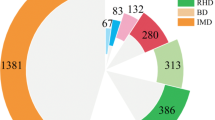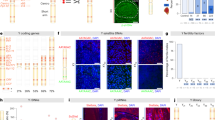Abstract
We describe a rapid and efficient diagnostic method for sex determination and the dystrophin gene by the polymerase chain reaction (PCR) using archived cytogenetic slides. Archived cytogenetic slides stored for about 4 years at room temperature were used. To confirm whether DNA analysis is possible using the archived cytogenetic slides, we extracted the DNA from the slides and amplified the Y centromeric region (DYZ3), the X centromeric region (DXZ1) and the exon 46 of the dystrophin gene. Of the 50 cases, 24 were peripheral bloods, 13 were amniotic fluid cells, 5 were chorionic villus samplings and 8 were cord bloods. The PCR related sex determination in 22 females and 28 males, showed 100% concordance with the results of chromosome analysis, and all cases showed positive band for the exon 46 of the dystrophin gene. Of the 50 cases of the archived cytogenetic slides, we were fortunate enough to obtain the fresh blood sample from one fetus whose karyotype showed 45,X[34]/46,X,+mar[145] to compare the results of the gDNA with that from archived cytogenetic slide. To confirm whether the marker chromosome was derived from Y chromosome, we studied the six loci (PABY, SRY, RPS4Y (SY16, 17), ZFY, DYS14) on the short arm, one locus (DYZ3) on the centromere and one locus (DYZ1) on the long arm. Of the 8 loci studies, all PCR related Y chromosome showed positive band from both gDNA obtained from cord blood and archived cytogenetic slides. We could conclude from the above results that the marker chromosome was derived from the Y chromosome. We believe our experiment is rapid and efficient for studies of over 10 independent loci from a single slide which has been kept in storage for up to 4 years and that archival Giemsa-stained cytogenetic slide repositories represent valuable DNA resources for clinical and forensic studies.
Similar content being viewed by others
Article PDF
Author information
Authors and Affiliations
Rights and permissions
This is an Open Access article distributed under the terms of the Creative Commons Attribution Non-Commercial License (http://creativecommons.org/licenses/by-nc/3.0/) which permits unrestricted non-commercial use, distribution, and reproduction in any medium, provided the original work is properly cited.
About this article
Cite this article
Choi, SK., Kim, JW., Park, SY. et al. Retroactive DNA analysis for sex determination and dystrophin gene by polymerase chain reaction with archived cytogenetic slides. Exp Mol Med 31, 36–41 (1999). https://doi.org/10.1038/emm.1999.6
Published:
Issue date:
DOI: https://doi.org/10.1038/emm.1999.6
Keywords
This article is cited by
-
Sex Genotyping of Archival Fixed and Immunolabeled Guinea Pig Cochleas
Scientific Reports (2018)
-
A novel method for sex determination by detecting the number of X chromosomes
International Journal of Legal Medicine (2015)



